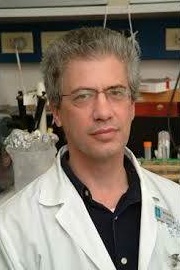
The Hadassah Medical Center is one of the prestigious participants in a global consortium sponsored by the Cure Alzheimer’s Fund (CAF), aimed at employing stem cells to eventually uncover the cure for Alzheimer’s disease. Prof. Tamir Ben-Hur, M.D., Ph.D, head of Hadassah’s Department of Neurology, is spearheading the research at Hadassah, which has received an initial grant of $100,000 from Cure for this purpose.
Prof. Ben-Hur explains that neural stem cells are able to renew themselves and generate various types of brain cells. While such cells form the brain during embryonic development, it has become clear that the adult brain, like many other tissues, also contains resident stem and precursor cells.
Brain regeneration, Prof. Ben-Hur relates, “can be achieved by only two possible approaches: either introducing such cells to the brain by transplantation (necessitating their growth and manipulation in the culture dish prior to transplantation) or by inducing the injured brain’s own resident stem and precursor cells to exit their quiescent state and enter a regenerative mode. These two complementary approaches are under extensive research, in an effort to translate them into clinical reality.”
During the last decade, Prof. Ben- Hur and several other research groups have shown that neural stem and precursor cells have additional therapeutic properties that may prove applicable clinically. In particular, they have shown that these cells possess unique immunologic properties by which they suppress inflammatory processes in the brain. They also possess trophic properties by which they can protect brain cells from injury, and even facilitate regenerative processes by neighboring cells.
Prof. Ben-Hur explains the impetus for his current research: “Having shown such therapeutic effects by transplantation of neural stem cells into the brain of animals with various disease models and since inflammatory and degenerative processes have critical roles in the development of Alzheimer’s disease, I hypothesized that the endogenous population of stem and precursor cells that reside in the brain may have a physiological role in protecting it from development of Alzheimer’s disease. The idea is that the resident stem cells in the brain do not just sit there awaiting injury, but may also have an active continuous role in protecting the brain. In the brain of Alzheimer’s disease, the physiological function of resident stem cells might be compromised, enabling the neurodegenerative process to develop.”
Therefore, in this project supported by Cure, Prof. Ben-Hur explains, he and his team “will investigate whether mouse and human neural stem cells that carry mutations which lead to the early development of Alzheimer’s disease are defective in their functional properties of ameliorating inflammation and protecting their environment. To that end, we will perform in-vitro and in vivo experiments using co-culture systems as well as transplantation into animal models of disease. We will compare the ability of normal neural stem cells to that of Alzheimer’s neural stem cells in their ability to: (1) inhibit inflammatory processes; (2) promote neurogenesis and gliogenesis (generation of neurons and glial cells of the brain); and (3) protect the brain from neurodegeneration.”
Putting this research into perspective, Prof. Ben-Hur notes that the goal is not to examine whether transplantation of stem cells will help patients with Alzheimer’s disease. Rather, its purpose is to “examine whether the brain has a potential to protect itself from developing the disease by proper function of its resident stem cells.” This knowledge, he says, could lead to defining new ways for battling Alzheimer’s disease.
The Consortium Team
Along with Prof. Ben-Hur on the consortium team are distinguished researchers from domestic and international institutes, including: Doo Yeon Kim, Ph.D, Harvard University Medical School and Massachusetts General Hospital (MA); Kevin Eggan, Ph.D., Harvard University Stem Cell Institute; Sam Gandy, M.D., Ph.D., Mount Sinai (NY) School of Medicine; and Scott Noggle, Ph.D, New York Stem Cell Foundation. Marc Tessier-Lavigne, Ph.D., President of The Rockefeller University (NY) is pursuing related research separately funded by CAF. The “Stem Cell Bank” created during this research will be available to researchers around the world, enhancing the ability of global scientific discovery to proceed at a more rapid pace.
